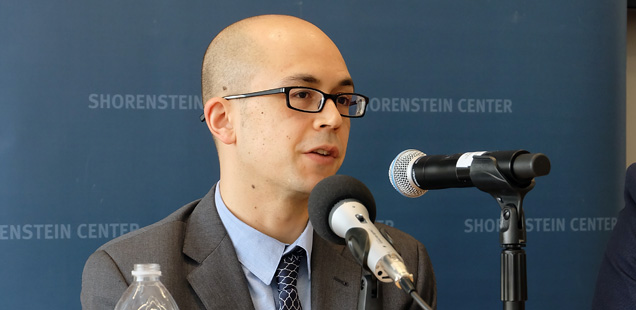March 27, 2018—Adam Serwer, senior editor at The Atlantic, discussed the role of race and class in U.S. politics, and its media coverage, during a visit to the Shorenstein Center. Below are some highlights of his conversation with Shorenstein Center Director Nicco Mele, as well as the full audio. The Shorenstein Center’s podcast is also available on iTunes, Google Play, iHeartRadio, and Stitcher.
Narratives about race and politics
“The nature of American politics is always to want to hold white people blameless when they act out of racism. In the case of [David] Duke, the reality is that in the 1990s, if it had been up to the white people of Louisiana, the state would have sent a Klansman to the U.S. Senate…faced with that, I think the impulse is to say we can’t really be that terrible, and so you have to find some rationalization, some explanation for why what is happening in front of your eyes is not actually happening. I think that same impulse was at work with Donald Trump’s candidacy.”
The nature of American politics is always to want to hold white people blameless when they act out of racism.
“The press is largely white…they don’t want to think of their friends and relatives and people they have close personal relationships with as having what is perceived as this incredible character flaw. So I think it’s easier for people to tell themselves that that’s not what’s going on, as opposed to saying straight out what it is. I think that’s partially why you see a big distinction…in the way Trump is written about from journalists of color than you often do with white journalists…there’s an awareness of explicit subtext with journalists of color. We’re cognizant of the fact that Trump is talking about us and people like us in a way that I think is easier for white journalists to dismiss.”
Race and class
“I want to distinguish between two things, between the idea that the white working class is suffering, and the idea that white working class suffering is the explanation for Trump. There’s no question that in a country like ours where almost all of the wage gains of the past 30-40 years have accrued almost entirely to people at the top of the income scale, that people below that, particularly people in the working class or poor, are struggling. The question is, to what extent are you willing to buy into a solution to that problem that blames other people on the basis of race?”
“People of color of similar class backgrounds did not like those solutions, and they didn’t like them because they were targeted by them…The economic factors that affected the white working class affected the black and Latino working classes even more deeply, and there was no corresponding drive toward extremism. After the [2008] recession you didn’t see Nation of Islam membership suddenly swelling as a result of black wealth being systematically destroyed by unscrupulous banks…the framing of this election was that it was a rebellion of the working class, and the story is much more complicated than that.”
Preparing for 2020 election media coverage
The federal government is an amazing repository of official knowledge, and when you have control over those types of things, you are able to manipulate the press in ways that we’ve seen a million times before.
“The real issue is going to be [that] the Trump administration has shown a lack of restraint when it comes to using the levers of the federal government for political purposes, and I think it will be very difficult for the press to deal with that…for example, there was a Department of Homeland Security report a while ago that said that most terrorism was caused by immigrants, but…essentially it defined homegrown terrorism by white supremacists as not [being] terrorism.”
“The federal government is an amazing repository of official knowledge, and when you have control over those types of things, you are able to manipulate the press in ways that we’ve seen a million times before. When you look at the war in Iraq, selective leaks to the press were part of the way that the case for the war was built. This time around in 2020, the Trump administration, which arguably has an even less intimate relationship with the truth than the Bush administration, is going to be able to manipulate that official knowledge in ways that I think the press is not necessarily prepared for.”
The Democratic Party’s response to “Trumpism”
“I think the Democrats are in a difficult place, because they have to figure out a way to appeal to the broadest section of white voters…no one wants to say that Trump is racist in part because if you do that, you taint his voters, and Democrats who want to reach out to those voters don’t want to make those people feel bad, because otherwise, they might not vote Democratic. So Democrats have to figure out a critique of Trump that brings more white voters into their camp while also not making their black and Latino constituents feel as though their concerns are being sidelined or dismissed. We have yet to see how good the post-Obama Democrats actually are at politics.”
The future U.S. politics and race relations
“I do think that people can change. I think that people are capable of being better. And I think that while the [Atlantic] essay is a strong case for the inevitability of history affecting the present, people can make different choices, and people can decide to reject the politics of white identity. We’ll see whether the nation is capable of it, but I certainly don’t think it’s inevitable that this is how our politics are going to be forever just because the politics of white identity have dominated America in the past.”
Article by Nilagia McCoy; photo by Allie Henske.


